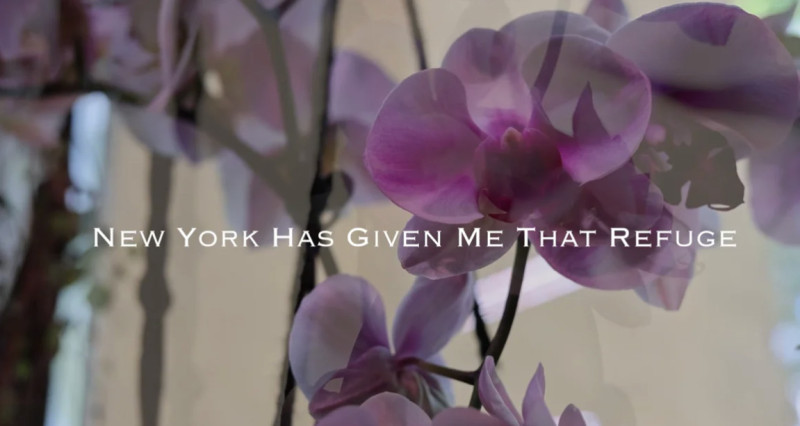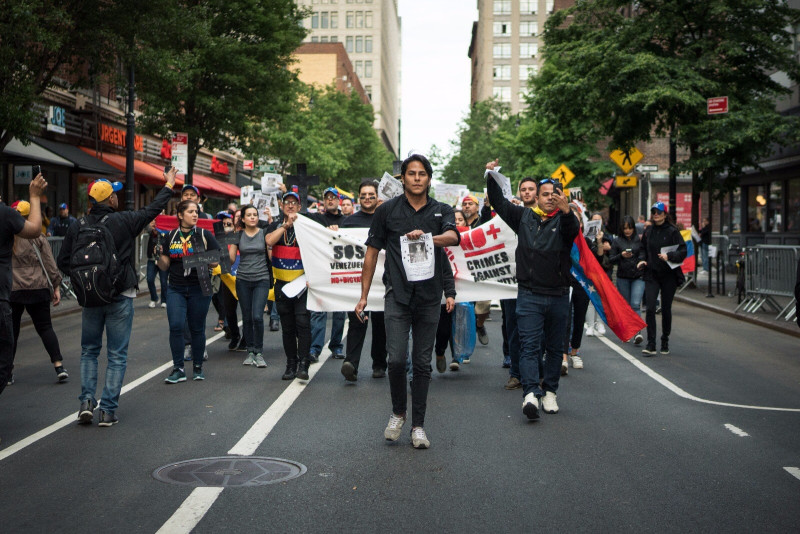
New York has given me that Refuge
In this film, refugee South Asian LGBTQ+ activist Barbara Khan talks about her migration from Pakistan and her life in New York as a trans woman.

How did you get to New York, like logistically? Did you have any friends that were waiting for you?
I just had a feeling. It was a good feeling, that I knew I had to leave Miami and come here, but I knew nobody, I knew only one person, a woman that I met randomly in 2010 on a train going from Milan to Paris and we were Facebook friends… […] I had to crash at her place so she would help me to understand the city at the very first month. And thanks to her and her kids and that put my feet somehow into ground. But after that I moved five times in New York, I was robbed deposits. I was scammed here and there. I faced insecurity as many people and after several months I was able to find this apartment and as a dog I just marked the corners, and I haven’t left.
Let’s walk back a little bit since you arrived to New York, where did you live at first? Like what general area and how did you come across this?
Well, I always wanted to live in Brooklyn to be honest… so I am very down to that hipster movement sort of, but never made it to Brooklyn. My friend, as I mentioned, she is from France, she lived in the Upper East Side. I went to Washington Heights, then I went down to Upper West Side. Then I went back to Upper East Side and that’s the funniest part. The one in Washington Heights was a room, chair… even I had to share my bed. I never had an experience like that in my life, but that was part of those scams that I had to face in this situation. I had my first panic attack in that apartment in one of the big snowstorms that happened in 2017 when I first just arrived…and I moved to a residence of males of the Catholic Church in 88 in Lexington. So, always Upper East or Upper West and then finally, when I found this place there were most students from Colombia living here and it’s only three rooms in this apartment and I got the biggest room so ever since I’ve been here.
How are your feelings throughout? Were you stressed constantly?
It was a mix of feelings. As I say, there were days that I had panic attacks. Washington Heights was a tough time… […] As I say, I learned how not to move while sleeping because I had to share my bed… that was tough. I never had to share my bed before, not even with a stranger. A completely stranger. […] And the residency of the Catholic Church was an experience by itself. I didn’t have kitchen. I didn’t have my room and a microwave. So, it was a lot of eating outside a lot of making sure what to eat or spending a lot of money… […] I guess that’s why I said the dog joke about this apartment because once I was able to came and to visit this place on a Sunday night and the roommates were like: Are you sure you don’t want to see it during the day? It’s even more beautiful to get to see the lighting, and I was like: I just need a place to call home, get my clothes out of our luggage and make sure I cannot see my luggage for a long time… just don’t get my things out of the suitcase and be able to have a closet, a space, a spot that I can call home.
Did you have to undergo through any bureaucratic challenges or channels in New York?
Fortunately, no. I would have had more challenges back in Miami because I was still like getting the papers or doing all the transcription, all the procedures and steps to get the asylum. […] Thanks to some officials in New York that I asked for help, they helped me to move my case to from Florida to New York, and that two years after I was called. I was in 2018 in the Office of Gillibrand, Senator Gillibrand, they helped me to move my case to New York. And then two years after, randomly I guess after the line or waiting line in New York, I was pulled for my interview. And I guess that ever since I’ve always paid on time with my renewal work permit, or renewal of these or that…
But ever since 2020, it’s just being a Pandora’s box. I have no idea where my case is, or even I bring my work permit in last year and this is the time that I haven’t received it. I know the law changed so I can still apply with that expired work permit, but those are the things that you don’t want to explain to when you’re looking for a job or applying for an apartment that you have all these intricacies and you happen to be different than any other alien in the US. With this job searching it’s somehow tricky because I have to say like: I know it looks expired, it says it’s expired, but you gotta read this page to tell you that it’s not expired.
Did you take advantage of any services in New York like language classes ?
At the beginning I only have once a food from a church in Washington Heights and I remember it because I still have the card to never forget that day. I’ve used the libraries and I’m trying to think at the beginning I might have used some courses, but honestly I’ve always rely more on putting myself out there and meeting people in the streets talking to people and creating my networks that way. I guess that’s how I’ve been “polished” in New York.
I’ll move to a different part of the interview, which is about experiences of discrimination and exclusion. Did you have the feeling of being welcomed openly in in the US? Generally when you arrived?
Yes and no… I feel like yes. It’s attached to the way I look. I’m 6’3 so I’m taller than most people everywhere I go. That always have made me more self-aware of myself and welcome or making myself welcome either they want me or not. It’s just like I’m gigantic. Somehow, I’m here. So, I don’t know if that’s attached that yes, it’s attached to my optimistic view of the world and life… […]
I guess one that I remember a lot, especially in the job searching… I tried to work with the IRC (International Rescue Committee). Supposedly they were working for refugees, and they treat me super badly and they didn’t hire me because I was a refugee. And I was like: You are nonsense. I realize that the projects that they were having on the funding that they had for that hiring happened to do with US purposes and there are laws that you cannot ask somebody foreigner get involved in political processes… But having this approach for people that raise money on our causes but not being able to hire the people from those causes, it’s for me nonsense. […]
However, I feel like lately after the pandemic and it has to do with the levels of unemployment, insecurity, inflation and the social issues that this country is facing by itself. That you see more violence out there, targeted discrimination. I being myself victim twice the first time somebody follow me on the train all the way to Queens and I had to jump in the train and get off the train before the doors were closing and making sure he stayed inside because he wanted to kick the **** out of me as he was yelling. And the second time was a month ago that somebody pushed me to the train, and I just got out stitches in my front head. Thankfully I’m OK. But again, I’m 6’3” and that’s something I thought never would happen to me.
Eric is a political refugee, co-founder of a political party from Venezuela and activist originally from Caracas, born in 1988. He was forced to leave his country in 2014 because of the regime and the dictatorship in Venezuela. In 2020 he has recieved a scholarship from Columbia University. Currently he is living in New York and is actively supporting the refugees and migrants from Venezuela. Eric is seen as the consul of Venezuela in New York.
Interview conducted by the We Refugees Archive team with Eric in the summer of 2022. The interview was edited for length and clarity.